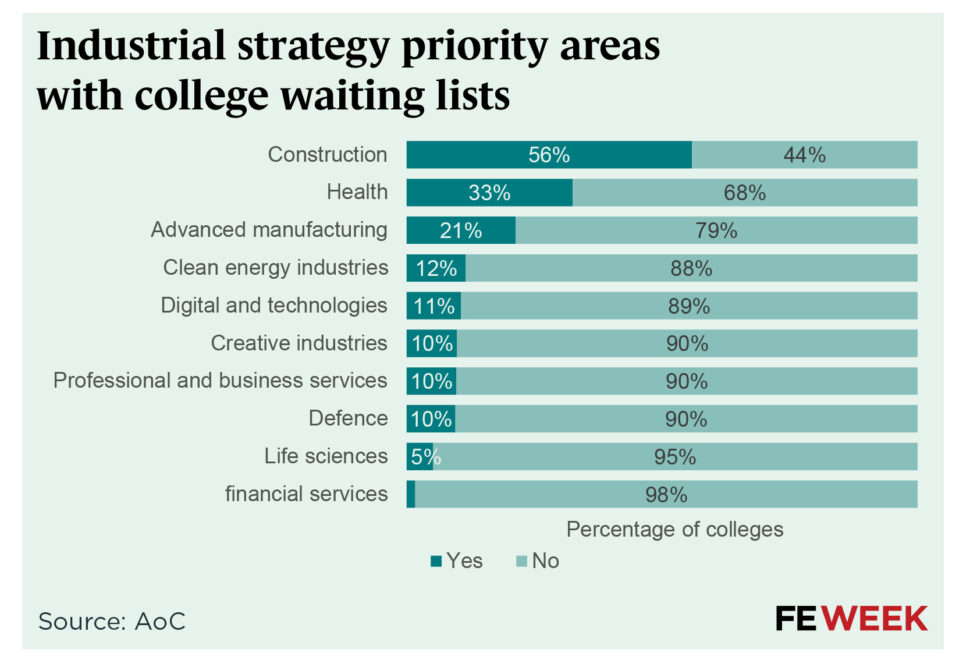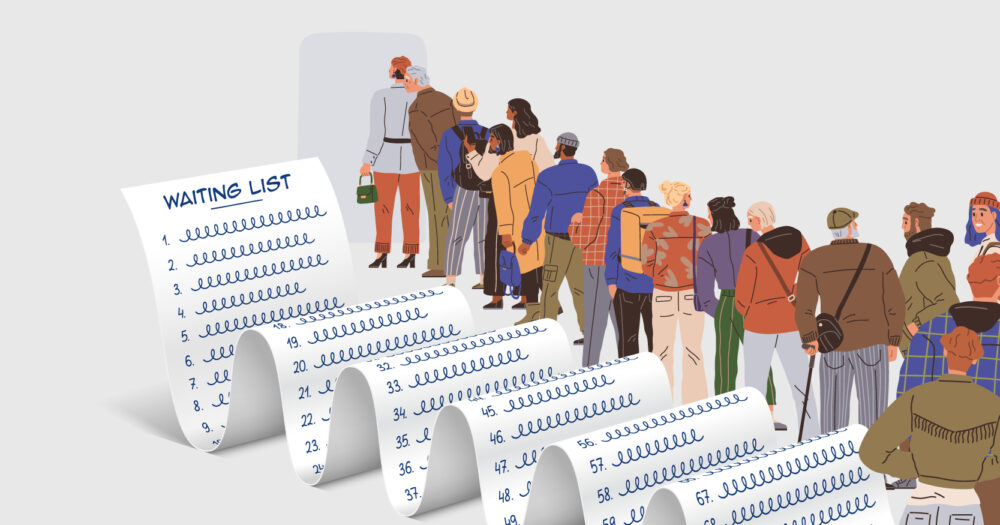Teacher shortages and lack of space have forced most colleges to close enrolments on construction courses – with over half setting up waiting lists to train tradespeople, data shows.
An enrolment survey of Association of Colleges (AoC) members found colleges reported waiting lists for courses in all eight industrial strategy priority sectors, plus health and construction.
The membership body urged policymakers to align funding mechanisms with “demand hotspots” to onboard more learners and “maximise economic impact”.
Based on 105 responses of 213 members, the survey found significant increases in demand for construction, electrical and engineering courses amid a demographic surge in young learners that was too great for current staffing levels and classroom availability.
The popularity spike for construction comes after ministers unveiled a £600 million injection into training 60,000 more “engineers, brickies, sparkies and chippies” this year.
It forms part of the Labour government’s target to build 1.5 million new homes by 2029, which housebuilders recently warned is too optimistic.
Overall, 89 per cent of colleges reported an increase of between 0.1 per cent to 19.9 per cent in enrolments for 2025-26 compared to the previous academic year.
The findings come after persistent warnings from colleges that demographic rises in young people would lead to a shortage of places on critical courses. The AoC previously estimated 25,000 extra school-leavers would try to enrol at college this year.
Over three-quarters (77 per cent) of colleges reported substantial demand for construction education, and over half (56 per cent) said they had waiting lists in the subject area.
Electrical courses were also popular, with 64 per cent of colleges receiving significantly
more enrolments, while 50 per cent said engineering enrolments were up and 48 per cent welcomed more students for health courses.
The majority (86 per cent) of respondents were experiencing increased demand in all the industrial strategy priority areas as well health and construction, with a third of colleges creating waiting lists for health courses.
“These subjects with the largest waiting lists mirror those experiencing strong growth in 16-to-18 and apprenticeship enrolments, suggesting continued high demand and capacity pressures,” the report said.
Demographic change was the most cited reason for the enrolments surge in 68 per cent
of college responses, followed by 51 per cent citing the impact of the 2025 summer GCSE results.
Most colleges reported capacity issues in almost all subject areas, forcing them to limit or halt enrolments in areas where “student interest overwhelms resources,” mostly in the construction and built environment subject area.
Capacity problems have also bled into apprenticeships provision, with nearly a third (32 per cent) of colleges limiting construction apprenticeship starts.
The only subject area with no capacity issue was modern foreign languages, where nearly one in five colleges (18 per cent) said they had experienced a marked decrease in enrolments, which could be explained by competition with school sixth forms.
T Level enrolments disappoint
The majority of survey respondents said T Level enrolments this year failed to meet forecasts.
The craft and design T Level – introduced last year – was least in demand with 89 per cent of colleges reporting registrations below expectations.
Meanwhile, 63 per cent noted lower enrolments in media, broadcasting and production, and digital data analytics (60 per cent), formerly known as digital business services.
Around half of colleges found numbers were on target, including in maintenance, installation and repair for engineering and manufacturing (63 per cent), and building services engineering (52 per cent)
Demand sky high for ESOL and resits
Colleges struggled to meet demand for their adult provision.
English for speakers of other languages (ESOL) was the area with the “highest unmet demand”, the report said, with 61 per cent falling short.
Meanwhile 41 per cent of colleges struggled to cope with applications for Free Courses for Jobs, which the AoC said was “particularly noteworthy” and would be investigated.
Enrolments in GCSE English and maths were also higher than expected.
Almost two-thirds (65 per cent) of colleges reported an increase in 16-to-18 GCSE English
enrolments and 61 per cent reported a rise in GCSE maths.
Demand also surged last year when 75 per cent of colleges reported higher-than-expected GCSE English enrolments, and 71 per cent witnessed a spike for GCSE maths.
Fewer colleges reported increases in functional skills English and maths (35 per cent
and 37 per cent respectively).
The report noted that the number of 16-year- olds rose 4.6 per cent year-on-year in 2024, then fell 0.3 per cent this year.
The Department for Education was approached for comment.

















Your thoughts